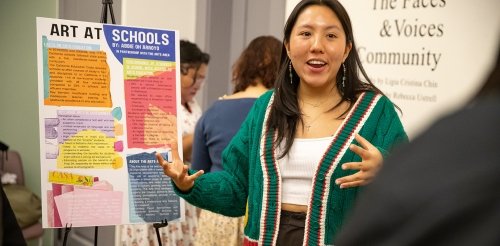CASA Pitzer Academic Program

About the Program
This program requires that you co-enroll in two courses and take part in a research fellowship:
- CASA 101 Critical Community Studies
- CASA 105 Research Methods for Community Change
- Participate in a 125-hour internship in the community
- You'll receive 3 credits for 2 classes
For more information about CASA Pitzer, please contact our Program Manager, Scarlett Duarte.
Goals
- Work collaboratively with community partners on research, service, organizing, and action projects that confront injustice and work towards justice, equity, rights, care, wellbeing, and community building.
- Ensure work is accountable to the community, makes a positive impact, achieves long and short term goals, and cares for those involved.
- Listen and respond to needs and assets of our local community and justice-oriented organizations
- Create a space that is inclusive, welcoming, and supportive for community-building, justice work, participatory action research and organizational development.
Principles
- Interconnection (our liberation are bound; the diminishing and healing of our humanity is locked in a “network of mutuality” (Martin Luther King, Jr.)
- Dedication to standing up to injustice and working for equity, well being and peace while creating joy, security, and connection
- Dedication to embodied justice and radical healing
- Imagination and Creativity (imagining the world we want and creatively cultivating it together)
- Respecting local knowledge, culture, assets, and power
- Cultivating long term and meaningful partnerships
- Following the lead of those most directly impacted in the community
- Prioritizing projects that work towards greater personal and systemic change
Community Engagement & Radical Accompaniment
Beyond the intensive student research fellowship that engages in-depth with local community organizations and partners, another central component of CASA is to develop critical spatial analysis through radical accompaniment and meaningful engagement with local community. This occurs through various walking and driving tours and day-long community engagement activities whereby students become familiar with the landscape of the Inland region, cutting across space, place, politics, culture, and geographical landscape.
These engagements vary from semester to semester depending on CASA Pitzer professors’ expertise, community need, and what is occurring politically and socially during the current semester.
Program Details
Students must take the 2 courses simultaneously:
- CASA 101 PZ-Critical Community Studies
- CASA 105 PZ-Research Methods for Community Change
CASA students explore current movements, theories and narratives centered around critical social justice issues in our local communities and effective means for making social change.
Courses will highlight frameworks and practices of community-based participatory action research, transformative movement organizing, and healing justice, which work on building peace, wellbeing and liberation from the inside out.
Students will apply theory to practice through interdisciplinary scholarship, in-class dialogues, writing assignments utilizing self-reflection and critical analysis, experiential learning, creative art activities, and direct engagement with local change-making organizations and movements through community-based participatory action research.
Our theoretical frameworks are grounded in a cross section of disciplines, including contributions from cultural studies, psychology, sociology, education, community health and political studies. Course praxis (theory + action +critical reflection) plays out in large part through the program’s intensive practicum (125-hour internship), class field-trips and interactive workshops that exemplify that which we study.
Students engage in hands-on applications of community-based education and develop greater awareness of their own positionalities and values, as well as local knowledge, assets, and approaches to social change.
CASA is designed for sophomores and juniors, and it satisfies the following majors:
- Sociology
- Environmental Analysis
- Organizational Studies
- Critical Global Studies
- American Studies
- Social Responsibility Praxis
- Social Justice Theory
- Intercultural Understanding (local)
Transportation Reimbursement
CASA Pitzer offers transportation reimbursement for all community-based travel (fall and spring semesters only) during your time in the program.
To be reimbursed, submit your receipts or mileage forms.
If you drove, you will also be required to submit a mileage form as we do not reimburse for gas.
CASA Pitzer Mileage Reimbursement Form Mileage Tracker Spreadsheet
Van Authorization
With CASA Pitzer being off campus, students will have the opportunity to ride to class in the Pitzer Vans.
If you are interested in being a van driver or being certified as the alternate driver, please complete the Van Authorization form and submit to Pitzer’s Human Resource Office.
Resources for Community-Based Participatory Research
Here are some resources for Community-Based Participatory Research that will be helpful during your time in this course.